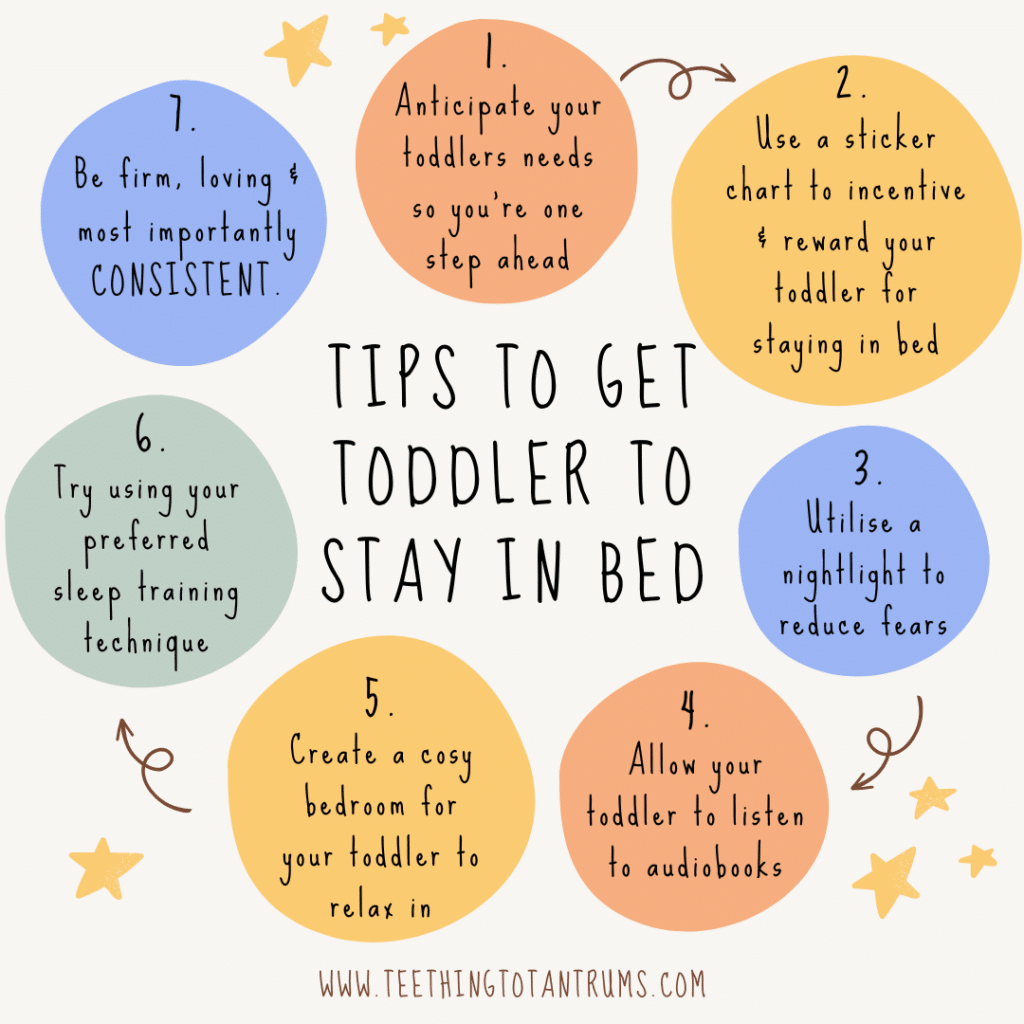As a parent, there’s nothing more frustrating than when your toddler won’t stay in bed. You’ve tried all the tactics you know, but nothing seems to work. So what’s your next step?

Table of Contents
Why Won’t My Toddler Stay in Bed?
If you’re struggling to get your toddler to stay in bed, you’re not alone. Many parents face bedtime battles with their little ones.
But in order to get your toddler to stay in bed, you need to identify the reason why they are leaving it.
Here are some possible reasons why your toddler won’t stay in bed:
1. They Are Not Tired Enough
Toddlers have a lot of energy, and if they’re not tired enough, they won’t want to go to sleep.
Make sure your toddler is getting enough physical activity during the day, and ensure they are exposed to natural light to help regulate their circadian rhythm. Also, ensure they are ready for sleep at bedtime.
Also, consider adjusting their nap schedule or bedtime by 10-15 minutes to ensure they are suitably tired when it’s time to go to bed.
2. There Is Not An Established Bedtime Routine In Place
If your toddler won’t stay in bed, remember how much toddlers thrive on routine. Having a consistent bedtime routine is essential to helping them feel calm and ready for sleep.
Make sure your toddler knows what to expect each night before bed by following the same routine every evening after teatime, with quiet play, bath, book, and bed.
TOP TIP: Avoid the use of screens in the two hours leading up to bedtime as the blue light emitted from devices is proven to hinder the production of melatoni,n which will impact your little one’s ability to fall asleep and stay asleep.
3. They Don’t Want To Be Alone
Toddlers quite naturally want to be with you all the time, and it can be hard for them to separate at bedtime. Especially if that is the only time of day they are expected to be away from you.
Consider giving your toddler a special stuffed animal or blanket to sleep with.
Super soft, very cuddly and the perfect companion to young children, the GUND Teddy Bears never fail to be toy box favourites for years to come!
4. They Have Not Learnt To Self Settle
Some toddlers struggle with self-settling, which means they have a hard time falling asleep alone or settling back to sleep if they wake in the night.
If this is the case, consider teaching your toddler some self-soothing techniques, such as deep breathing or counting.
If you have been rocking your little one to sleep up until now… they may struggle to transition to falling asleep in their bed alone. Try using some sleep training techniques to gradually get them used to falling asleep alone. (I prefer the gradual retreat sleep training method. Keep reading to learn more)
5. That Have A Fear Of Missing Out: FOMO
If your toddler won’t stay in bed, it may be because they’re curious, and might worry they’re missing out on something if they go to sleep.
Reassure your toddler that everything will still be there in the morning and that they need a good night’s sleep to feel their best and to have enough energy to enjoy it all!
TOP TIP: If your toddler is asking to do things with you once they’ve been put to bed, tell them that you are going to do something you know they would find really boring (like deep cleaning the floors, putting the washing away, writing emails etc) therefore, they won’t be interested in joining you. And hopefully, will choose to stay in bed instead.
6. They Have Just Moved From A Crib To A Bed
Moving from a crib to a bed can be a big transition for toddlers. So make sure your toddler feels safe and secure in their new bed.
You might consider using bed rails or a special bed designed for toddlers.
Introduce them to their bed gradually, talk about the move and get them to help with the choice of bedding.
You can also try putting a favourite soft toy to sleep in the bed for a couple of nights before suggesting that your little one joins them.
7. They Are Afraid Of The Dark
Many toddlers are afraid of the dark. Consider using a nightlight or leaving the door cracked open to help your toddler feel more secure.
This night light also projects onto the ceiling which can give your toddler something to focus on as they fall asleep.
With time and patience, you can help your little one develop good sleep patterns and get a good night’s sleep.
Finding the right night light for your child can be quite a task. You want something safe, comforting, and practical. The Cozy Starry Night Light ticks these boxes, with eye-friendly warm lighting and an easy-to-use dimmer.
Its gentle glow makes it the best night light for feeding baby, diaper changes, or comforting your little one back to sleep.
As your baby grows the Cozy Starry Night Light's starry sky projection can provide comfort and gentle quiet time stimulation. Its soft lighting ensures a dreamy, peaceful environment, supporting your baby’s natural sleep cycle.
It really is a fantastic nightlight (at a very reasonable price!)
- Eye-friendly warm lighting with adjustable brightness.
- Includes a timer function for convenience.
- Projects a starry sky that is soothing for little ones.
- Rechargeable battery, so it's very portable.
- A USB adapter is not included for charging.
- The star projector is static without motion (however, this is ideal for very young babies and toddlers).
- Battery life varies based on the brightness settings.
8. They Have Experienced A Sleep Regression
A sleep regression can easily throw your toddler’s healthy sleep habits out of the window if not handled properly. It can also mean your toddler won’t stay in bed because their sleep schedules are thrown off. To learn more about sleep regressions, read these posts:
- 12 Month Sleep Regression
- 18 Month Sleep Regression
- Sleep Regression: What, Why, Signs And Solutions
Looking to get your little one to sleep quickly and effortlessly? Check out my Bedtime and Nap Cheat Sheet and master the art of making daytime naps and bedtimes as seamless as possible.
A bedtime & nap cheat sheet so good your little one will ask you to put them to bed...
Laura Williams "This is a life saver! I'm so glad I downloaded your bedtime & nap cheat sheet. My little one actually asked me to put him to bed last night! Unbelievable! Thank you so much!"
Click Here For The FREE Cheat Sheet
Top Tips for Getting Your Toddler to Stay in Bed
Now we know the common triggers for why your toddler won’t stay in bed, you can create a plan of action to move forward and help them stay put once you’ve said goodnight.
Here are some tips to help you keep your little one going to bed and staying there:

- Stay One Step Ahead: Try to anticipate your toddler’s needs before they become disruptive. If your child is thirsty at night, leave a sippy cup of water by the bed. If they need to use the bathroom, remind them to go before bedtime.
- Use a Sticker Chart: Create a sticker chart to reward your toddler for staying in bed all night. Every time they stay in bed, give them a sticker. When they reach a certain number of stickers, give them a special treat.
- Use a Night Light: A night light can help your toddler feel more secure and less afraid of the dark. Choose a soft, warm light that won’t disrupt their sleep.
- Listen to Audio Books: Playing an audiobook can really help your toddler relax and fall asleep. Choose a gentle story with a soothing narrator.
- Create a Cozy Bedroom: Make your toddler’s bedroom a cosy and inviting space. Use soft lighting, comfortable bedding, favourite bedtime books and a stuffed toy for comfort. Encourage them to spend some quiet time in their room during the day without the pressure of having to fall asleep.
- Use a Sleep Training Technique: Sleep training methods such as bedtime fading or promising to return are ideal ways of gently encouraging your little one to stay in bed.
- Be Firm but Loving and Consistent: Don’t let bad habits develop by giving in. If your toddler gets out of bed calmly return them to bed with as little discussion as possible and repeat as many times as necessary.
By following these tips, you can help your toddler develop healthy sleep habits and stay in bed all night long.
Remember to praise your child for their efforts and be patient as they learn to sleep on their own and never shout, berate, or punish if your toddler won’t stay in bed.
TOP TIP: Toddlers can be very persistent and it can feel like you’re never going to get them to stay in bed… However, I can tell you from experience that sticking with the programme and staying calm will usually produce the result you want.
Best Sleep Training Methods for Teaching Your Toddler to Stay in Bed
Here are my two favourite sleep training methods to use when your toddler won’t stay in bed. I have used both techniques with great success, but I prefer the Gradual Retreat technique the most.
If you want to try sleep training, give both techniques a try and see what works best for your family.
Bedtime Fading (Gradual Retreat):
When your toddler won’t stay in bed, this technique works very well if you are happy to wait with your toddler for a little bit every evening.
Start by sitting next to the bed for a few minutes and gradually move further away each night until your toddler can fall asleep on their own.
Some toddlers will need to wait until they’re fast asleep, others will be happy for you to depart once they’re drifting off.
Remember to keep interactions to a minimum and use limited words to make the most of this technique.
Promised Return:
This method is also really effective for keeping your toddler in bed.
Say goodnight and say that you have a chore to do and will be back in a few minutes. Always return (don’t leave them for too long) and repeat until they are asleep on one of your returns.
Each night extend the time you leave them and you will find that eventually, they will be falling asleep on your first return.
Cry It Out:
I do not recommend the Cry It Out Method, especially so when your toddler won’t stay in bed. I believe it is too harsh for young children and as there are other techniques that work well to teach your little one to sleep independently, I do not see the need to incorporate additional emotional stress into the situation.
REMEMBER: Always praise your toddler for good behaviour and use positive reinforcement to encourage them to stay in bed. Be sympathetic to their fears and concerns but stay consistent that they must stay in bed. With patience and persistence, you will establish healthy sleep habits for your toddler.
What To Do If Your Toddler Is Afraid Of The Dark
It’s not uncommon for toddlers to be afraid of the dark. If your little one is struggling with this fear, there are a few things you can do to help them feel more comfortable and secure.
- Make sure your child’s room is well-lit. A nightlight or a lamp with a low-wattage bulb can provide just enough light to help your child feel safe and secure without keeping them awake.
- Try to get to the root of your child’s fear. Ask open-ended questions to allow your child to tell you what’s triggering their fear. Listen to your child to help them identify their fear and name it. Remember that what may seem funny or trivial to you, can feel very real to your child.
- Use a comfort item like a favourite stuffed animal or blanket to help your little one feel less anxious and scared.
- Be patient and understanding. Remember that fears are a normal part of childhood development, and it may take some time for your child to feel comfortable sleeping in the dark. With a little patience and support, your child will eventually overcome their fear and learn to sleep soundly through the night.
- Read books about being afraid of the dark and discuss how the characters in the book deal with their fear. Often this is a perfect way to help your little one deal with their own concerns and prompt conversation about why they are scared.
Join Orion on an imaginative adventure through the world of the dark! In this beautifully illustrated children's book, author Emma Yarlett explores the concept of fear and how we can overcome it. Follow Orion as he learns to face his fears and discovers the magic and wonder that can be found in the dark. With engaging storytelling and stunning illustrations, "Orion and the Dark" is a must-read for children and parents alike.
How to Keep Your Toddler in Bed When Transitioning from Crib?
Transitioning from a crib to a toddler bed can be a challenging time for both parents and toddlers.
Many parents put off moving their toddler into a bed because they fear it will mean an end to their peaceful evenings and they are not sure how to keep their toddler from getting out of bed each night.
It is naturally quite common during this transition that your toddler won’t stay in bed because they have a newfound freedom.
However, it is important that you start as you mean to go on and make it clear that getting out of bed after lights out is not an option.
Here are some tips to help keep your toddler in bed:
- Make the bed inviting: When selecting a toddler bed, look for one that is low to the ground and has safety rails on both sides. Get your toddler involved in choosing the bed linen and have some of their favourite toys and books close to hand.
- If you have not done so already now is the time to establish a bedtime routine: A consistent bedtime routine can help your toddler feel secure and comfortable in their new bed. Include activities like reading a story, singing a lullaby, or giving a goodnight hug to help your toddler wind down and prepare for sleep.
- Make your expectations clear: Talk about the transition and explain to your toddler that they need to stay in bed and go to sleep just like they did in their crib
- Use positive reinforcement: Praise your toddler for staying in bed and following the bedtime routine. You can use a sticker chart or small rewards to encourage good behaviour.
- Be consistent: Consistency is key when it comes to keeping your toddler in bed. Stick to the same bedtime routine every night and be firm when it comes to enforcing bedtime rules. Return your child to bed each time they get up with as little conversation as possible.
- Address fears and anxieties: If your toddler is afraid of the dark or has separation anxiety, address these issues before bedtime. Use a nightlight or a favourite stuffed animal to provide comfort and reassurance as I mentioned above.
REMEMBER: Transitioning from a crib to a toddler bed takes time and patience. Managing this transition calmly and consistently will help your toddler adjust to their new bed and help you all get a good night’s sleep.
Frequently Asked Questions When Your Toddler Won’t Stay In Bed
Looking for more information about what to do when your toddler won’t stay in bed? Here are the answers to the most common questions.
How Do I Get My Toddler To Stay In Bed In The Middle Of Night?
Ensuring your toddler is getting the right amount of sleep during the day, eliminating screen time in the lead-up to bedtime and establishing a consistent bedtime routine will help to reduce the amount of nighttime waking.
However, if your toddler won’t stay in bed when they wake in the middle of the night… calmly and firmly lead them back to bed without engaging in conversation or play and repeat as often as necessary.
It is important that you do not give in at any point.
How Do I Get My Toddler To Stay In Bed For Nap?
To get your toddler to stay in bed for a nap, establish a consistent nap routine and stick to it. Make sure your toddler has a comfortable sleeping environment and a favourite stuffed animal or blanket. If they leave their bed, calmly and firmly lead them back to bed without engaging in conversation or play.
Don’t pressurise them to fall asleep but rather encourage them to stay in their room and enjoy some quiet time by offering them some books to look at or an audiobook to listen to.
How Do I Help My Toddler To Stay In Bed?
To help your toddler stay in bed, be consistent in your approach and establish clear boundaries. Avoid giving in to your child’s demands or engaging in conversation or play when they get out of bed. Consider using a reward system to encourage positive behavior.
If your toddler is not staying in bed when they wake up early, be sure to watch this video to learn how to manage this behavior:
Is It Ok To Lock My Toddler In Their Room At Night?
No, it is not OK to lock a toddler in their room at night as it can be dangerous in case of an emergency. If all other attempts at keeping your toddler in bed have failed you could consider using a baby gate.
Should I Consult A Pediatrician If My Toddler Won’t Sleep?
If your toddler’s sleep issues persist despite your best efforts, it may be helpful to consult a pediatrician or sleep consultant. They can rule out any underlying medical issues and provide guidance on how to improve your toddler’s sleep habits.
Need More Parenting Help?
- Download our FREE Bedtime & Nap Sleep Cheat Sheet. It’s a free, easy-to-use and proven formula designed for parents of 0-5 year olds to master the art of consistently undisturbed and restful sleep without the yelling, nagging or exhausting long-winded evenings.
- Check out our Parenting Toolbox. You’ll get access to expertly-chosen products that you can guarantee are the best for your little one and your wallet.
- Are you looking for personalized guidance to navigate the challenges of parenting? I offer 1-on-1 consultations to bring you tailored strategies and actionable advice to help support your child's growth and well-being with confidence.

A bedtime & nap cheat sheet so good your little one will ask you to put them to bed...
Laura Williams "This is a life saver! I'm so glad I downloaded your bedtime & nap cheat sheet. My little one actually asked me to put him to bed last night! Unbelievable! Thank you so much!"
Click Here For The FREE Cheat Sheet





